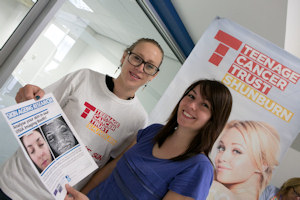University dermatologists take on burning issues at Manchester Airport
19 Jun 2014
Experts from The University of Manchester's Dermatology Centre are teaming up with the Teenage Cancer Trust at Manchester Airport this month, to educate passengers on how to stay safe in the sun and the dangers of skin cancer, as part of the charity’s annual Shunburn campaign.

From 23 – 29 June, the scientists and charity will be in Terminal One Departures showing passengers the effects too much sun can have on the skin with the help of a skin analysis machine. Passengers will also have access to skin experts who will offer advice, demonstrate how to apply sun protection correctly and have the chance to pick up free samples of sun cream in the correct SPF factor for their skin.
Shunburn is Teenage Cancer Trust’s annual sun safety campaign predominately aimed at 13-24 year olds. It educates young people about the damage sunburn can do to the skin and the steps that can be taken to avoid burning and over exposure to UV light. It also highlights that it is the damage done to skin when young, which could lead to developing skin cancer in later life.
Incidences of skin cancer are increasing in the UK more quickly than any other cancer, with around 35 people diagnosed with skin cancer every day, a total of nearly 13,000 a year . In the 15 to 24 age group it is the third most common cancer in females and the sixth most common in males across the UK .
Past Teenage Cancer Trust Shunburn surveys has uncovered some worrying trends amongst young Brits including:
• 58% do not know how to apply sun cream correctly
• 15% incorrectly believe that using sunbeds to build up a ‘base tan’ before going on holiday, prevents burning whilst away
• 11% incorrectly believe that sun beds are safe if only used once a week
Tricia Williams, Customer Service Director at Manchester Airport said: “The wellbeing of all of our passengers is paramount, so we are delighted to be able to offer this initiative this summer, which is the ideal time to educate school leavers jetting off on their first holiday with friends. As well as raising awareness of a sensitive and worthwhile issue, it will hopefully educate people and ensure passengers have the adequate protection from the sun. We wish Teenage Cancer Trust the best of luck with the campaign and look forward to hearing feedback from passengers.”
Professor Chris Griffiths, Director of the Dermatology Research Centre at The University of Manchester and Consultant Dermatologist at Salford Royal NHS Foundation Trust, said “Most skin cancers can be cured if detected early. One of the main causes of skin cancer is sunburn. Preventing this will go a long way to reducing the risk of skin cancer and of developing wrinkles and other signs of premature ageing. The best way to detect skin cancer is to check your skin regularly, from top to toe. You should tell your doctor immediately about any changes to a mole.
“However, it is still possible to enjoy the sunshine this summer by taking a few important steps to protect the skin, such as using a high SPF sunscreen with the UVA circle sunscreen daily.”
The week-long trial is hoping to raise awareness amongst a proportion of the 21m passengers that use Manchester, the UK’s third busiest airport each year. If successful it will potentially be rolled out for longer and also trialled at MAG’s other airports, which include London Stansted, East Midlands and Bournemouth Airport.
Teenage Cancer Trust also supports secondary schools, colleges and universities across the UK by delivering free sun safety sessions. A sun safety teaching pack can also be downloaded for schools to use for free at www.teenagecancertrust.org/shunburn Teenage Cancer Trust also offers a free burn alert text message service which reminds young people to stay safe in the sun during the hottest days of the year. To sign-up text BURN2 to 70300.
For more information see www.manchesterairport.co.uk or visit www.teenagecancertrust.org/shunburn
ENDS
